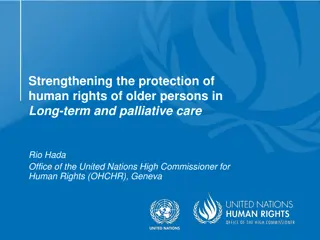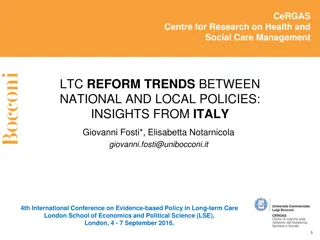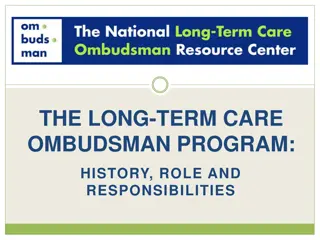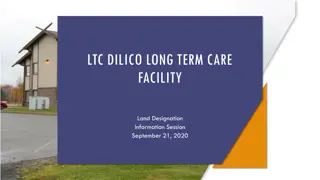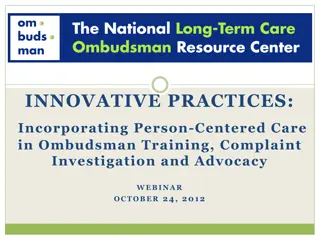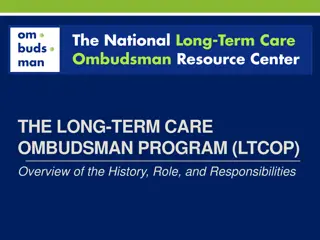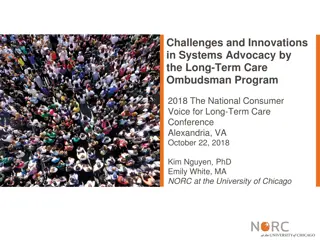Decent Work & Quality Long-Term Care Systems Report
The independent report commissioned by Public Services International focuses on showcasing successful models for accountable, high-quality long-term care, providing evidence-based resources and reforms to support workers, care recipients, and society. It highlights the importance of formal care for older adults, discusses failures in long-term care in the Global South, and addresses issues related to unpaid and paid care services in the context of demographic changes.
Download Presentation

Please find below an Image/Link to download the presentation.
The content on the website is provided AS IS for your information and personal use only. It may not be sold, licensed, or shared on other websites without obtaining consent from the author. Download presentation by click this link. If you encounter any issues during the download, it is possible that the publisher has removed the file from their server.
E N D
Presentation Transcript
An independent report commissioned by Public Services International (PSI) Co-Authors Dr. Sara Charlesworth, Professor Emerita, RMIT University, Melbourne, Australia Dr. Ian Cunningham, Professor, University of Strathclyde , Glasgow, Scotland Dr. Tamara Daly, Professor, York University, Toronto, Canada Online presentation to PSI Long-Term Care Network Affiliates: January 25 & January 31, 2024
Aims LTC in context Our Method Principles and Indicators Conditions that produce unacceptable forms of work and unacceptable care Typology What should unions do? Questions for consideration Overview Charlesworth, Cunningham & Daly 2024: Decent Work & Quality Long-term Care Systems 2
Our Aims Showcase examples of successful models deliver accountable, high deliver accountable, high- -quality Long Provide trade unions with an evidence indicators indicators and potential reforms to national long potential reforms to national long- -term care (LTC) sectors support local workers, care recipients support local workers, care recipients and society For use in: Campaigns, Public Education and Bargaining successful models and quality Long- -term Care evidence- -based resource and reforms reforms that support workers to support workers to term Care (LTC) based resource documenting a suite of term care (LTC) sectors that society. suite of Charlesworth, Cunningham & Daly 2024: Decent Work & Quality Long-term Care Systems 3
LTC in context Residential and home care services are provided by paid workers + informal, familial and unpaid care Long-term care spans: aged care services, disability services, and health services for the chronically ill. Our focus: care for older adults + formal care This focus is important for number of reasons: Women are overrepresented in ALL forms of unpaid care work Many countries a sharp decline in available informal / familial care: migration of younger people to larger cities Increase in women engaged in paid work, and outbound migration. In most OECD countries, these demographic changes have resulted in an increase in formal services offered by the state, the market, or the non-profit-sector but it remains insufficient given the need 4 Charlesworth, Cunningham & Daly 2024: Decent Work & Quality Long-term Care Systems
Failures in LTC Global South consequences of (over) reliance on informal care Decline in familial care especially acute Growth of global care value chains, shortages of health + LTC workers further depleting already limited paid and unpaid care resources. With population ageing a risk of multinationals identifying new LTC markets. Without proper state regulation + commitment, these countries, their workers, and care receivers vulnerable to the financialised strategies of multinationals familiar in countries in the Global North Global North growth of unacceptable forms of LTC work Introduction of a range of policies pursued by governments associated with the neoliberal marketization of the LTC sector. Perpetuates the undervaluation of the skills of the overwhelmingly female workforce and the decrease in care quality experienced by recipients of LTC. Charlesworth, Cunningham & Daly 2024: Decent Work & Quality Long-term Care Systems 5
Cautionary Tale As Global South moves towards more formal care, failures in the Global North serve as a warning Consequences of marketization for pay and working conditions: Public service supply chain relationships Gender and the undervaluation of care Troubling use of technology in LTC Profiting from LTC through financialization Charlesworth, Cunningham & Daly 2024: Decent Work & Quality Long-term Care Systems 6
Methods 4 Phases Phase 1 -- Literature Review Principles & Indicators Literature Review Analysis of the cases + Lit review = basis for identifying key principles that underpin decent work and good quality services in LTC Phase 2 -- Case Case Studies Studies Australia; Canada (British Columbia / Ontario); Scotland; France; Chile; India; South Africa; & Fiji Phase 3 -- Typology Typology of of LTC LTC Systems Systems according to the jurisdiction s regimes regimes for for care, care, employment employment and migration migration. Country approaches to the various factors factors Green flag country has achieved or is making progress towards decent work and good quality LTC; Yellow flag mid-range performance towards decent work and good quality aged care with more attention to particular factors required; Red flag less progress towards decent work and good quality . Phase 4 -- -- Recommendations Recommendations for for worker worker / / union union advocacy advocacy Promising approaches that advance the goals of decent work and good quality LTC Charlesworth, Cunningham & Daly 2024: Decent Work & Quality Long-term Care Systems 7
RMIT Classification: Trusted Phase 1 Charlesworth, Cunningham & Daly 2024: Decent Work & Quality Long-term Care Systems 8
Principles for Decent Work / Quality LTC Public funding that meets the cost of care Public or non- profit delivery Public Stewardship Public Data Transparency and Accountability Decent Working Conditions Dignity in Care Charlesworth, Cunningham & Daly 2024: Decent Work & Quality Long-term Care Systems 9
Quality Indicators for LTC Quality systems that support high-quality models of care and adequate staffing Quality working conditions Quality care conditions Charlesworth, Cunningham & Daly 2024: Decent Work & Quality Long-term Care Systems 10
RMIT Classification: Trusted Phase 2 Charlesworth, Cunningham & Daly 2024: Decent Work & Quality Long-term Care Systems 11
RMIT Classification: Trusted Typology A country s approaches to LTC are: formed by a range of interlocking sets of rules, laws and norms structure who gets care, by whom, where, when and who pays for it. These structures can be categorized into three intersecting regimes : Care Employment Migration Charlesworth, Cunningham & Daly 2024: Decent Work & Quality Long-term Care Systems 12
Factors Decent Work / Good Care by Regime Type Employment regimes can protect or create risks for aged care workers through limits on the scope of employment protection and through weak enforcement. Migration regimes are structured by the degree of reliance on workers from other countries or the extent to which a country produces care workers for them to then leave to work abroad. Care regimes for LTC are produced by differences in the conditions for care. Policy priority afforded to LTC; Model of LTC; Availability of formal home, community and residential options; Ratio of LTC workers to older adults who require care; Extent of the reliance on familial and informal and/or formal and paid care; Provider ownership types for LTC and home care reflecting the extent of for- profit provision relative to public sector and non-profit provision; and Model of approval for publicly-funded services. Labour rights; Strength of employment regulation; Protective gaps in formal aged care work: level of regulation relative to enforcement and protections; Access to collective bargaining; Pay & conditions of aged care workers relative to other national workers, aiming for equitable pay rates that reflect the skills used and the requirements of the work. Capability of producing a domestic care workforce relative to relying on growing the workforce through migrant workers; Degree of reliance on domestic workers relative to migrant workers; and Legal supports for migrant worker rights, including the extent of employment, political and social protection rights enjoyed by these workers. 13 Charlesworth, Cunningham & Daly 2024: Decent Work & Quality Long-term Care Systems
RMIT Classification: Trusted Phase 3 Charlesworth, Cunningham & Daly 2024: Decent Work & Quality Long-term Care Systems 14
Charlesworth, Cunningham & Daly 2024: Decent Work & Quality Long-term Care Systems 15
16 Charlesworth, Cunningham & Daly 2024: Decent Work & Quality Long-term Care Systems
Charlesworth, Cunningham & Daly 2024: Decent Work & Quality Long-term Care Systems 17 Charlesworth, Cunningham and Daly, 2024, Decent Work and Quality Long-term Care Systems
Competition for resources Anti-unionism among employers Poorer conditions for migrant workers Limited information regarding care labour markets in some countries Challenges & Pitfalls for Unions Charlesworth, Cunningham & Daly 2024: Decent Work & Quality Long-term Care Systems 19
Although the preference of PSI is for public provision of LTC, the reality for LTC systems across the globe is a mixed provision. In the light of the findings in this report, including the individual case studies, we recommend the following PSI campaign focus recommend the following PSI campaign focus: we For countries in the Global South unlikely to have an integrated LTC system, this means ensuring health provision can offer services to older adults. Campaign to improve LTC provision by building and strengthening current health care systems. Gather accurate data from Global South countries on the formal and informal care workforce. What should Unions do? Joint Action between PSI affiliates in sending and receiving countries to focus on migrant workers rights in receiving countries, as well as supporting a greater reliance on creating and sustaining a local care workforce. Our Recommendations Focus on ensuring the employment rights of informal workers in countries of the Global South, including the payment of a proper wage rather than stipends. Campaign on the principle that decent work underpins high- quality LTC. Campaign for the principles of decent working conditions to be incorporated into the decision- making of public bodies responsible for LTC procurement and commissioning. Adopt the six principles outlined in this Report as a pathway to campaigning for decent work and decent, quality LTC. 20 Charlesworth, Cunningham & Daly 2024: Decent Work & Quality Long-term Care Systems
What Should Unions Do? Our Recommendations Bring all external providers under some form of collective bargaining, where possible. Sector-level collective bargaining is preferable but attention needs also to be given to workplace representation and voice. Campaign for greater transparency in the financial transactions of multinational corporations to ensure that public funds are invested properly in LTC. Evaluate current organising strategies in the LTC sector to effectively target workers for membership across the public, private and voluntary sectors. Advocate appropriate client- staffing ratios in LTC, further underscored by lessons from the COVID-19 pandemic. Campaign for a decent wage that recognises the gendered undervaluation of paid care work, the disparity between private, public and voluntary workers, the erosion of career paths and pay classifications and relativities. Improve other non-wage benefits, with particular attention given to increases paid leave, pension entitlements and job security. Campaign for the full cost of care to be met so that home care workers are paid for the time they travel between clients. Reorganise staff working hours to ensure decent working time arrangements and end underemployment. End the use of exploitative forms of contract such as zero-hours contracts (such as those common in the UK). Avoid work-family conflict by addressing problems of fragmented shifts. Ensure there is worker voice/representation when introducing new technology. Charlesworth, Cunningham & Daly 2024: Decent Work & Quality Long-term Care Systems 21 Charlesworth, Cunningham and Daly, 2024, Decent Work and Quality Long-term Care Systems
What reforms are most needed now and in future? Which of these recommendations are most feasible given your contexts and constraints? How can local and international unions enable the changes? What resources are needed to enable change? Are there any additional recommendations you have given your experiences? Questions for consideration Charlesworth, Cunningham & Daly 2024: Decent Work & Quality Long-term Care Systems 22
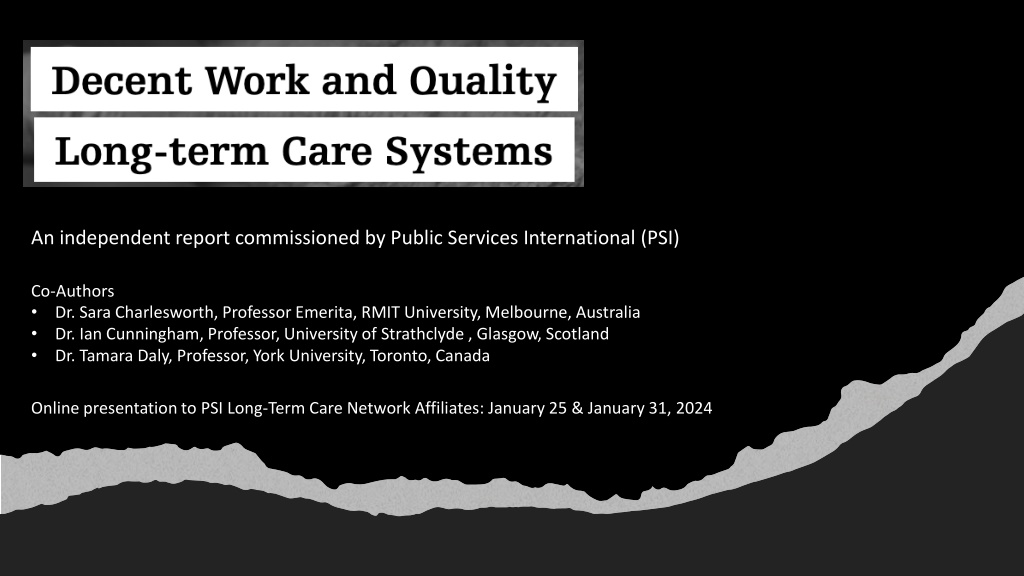
 undefined
undefined


 undefined
undefined









